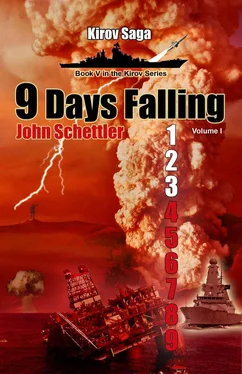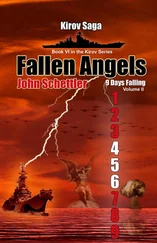“Look,” said the Sergeant. “We’ll deal with you when we get down south.” He pointed a threatening finger Orlov’s way. “Nobody seems to know you, but you’re wearing an NKVD uniform. What unit are you? What are these orders you say you have for the Commissar? Do you think we are stupid here?”
“No, I just think you look stupid,” Orlov jibed. “I’ll tell you why the Germans are kicking our ass in this war. Because we can’t seem to sort out who we’re fighting against! If it were me, I’d be back there in Kizlyar in a trench on the river line with the fighting NKVD, not out rounding up innocent girls and old ladies for Molla and his comrades. Which do you like, Sergeant—the little girls or the old babushkas? That’s why we’re losing this damn war, eh?”
The Sergeant waved him off, and craned his neck to look outside, but the look on his face told Orlov that last remark had hit a nerve. Orlov grinned, and he saw two of the other men suppress a smile as well.
They finally found the river, narrowing to no more than a hundred meters or so, a silty brown flow heading toward the sea. They followed the north bank for some time, but there were no bridges, so the trucks kept on. The dry land was slowly squeezed between the thinning stream of the river and the thickening marshes to the north. In time they came struggling along a narrowing track until the lead truck simply ground to a halt, its tires sunk deep in a bog. The column stopped, and Orlov heard the harsh voice of the Colonel up ahead, shouting orders. There was a rustle of men and equipment, the sound of women’s voices mixed in, and then the Colonel stuck his head into the back of their truck.
“Out! We walk from here. The trucks can go no further. It’s just a kilometer to the bridge at Kazgan. Then we’ll find new vehicles on the other side. Keep a close eye on him,” he pointed at Orlov, frowning. “He wants to see Comrade Molla? Very well, he will see him soon enough.”
The Colonel meant that as a threat, but it gave Orlov heart. Good, he thought. They’re taking me to Molla! What could be better? I’ve a revolver with six bullets in my pocket and all the time in the world.
He had the heady feeling that he was invulnerable, like a demigod that had fallen from the heavens into this world of stupid little men. He was omniscient as long as he kept hold of his service jacket and could listen to Svetlana whispering in his earbuds. He could tell them what would happen tomorrow, next week, next month, next year. No man among them would believe him, though the sailors on the Soviet trawler, T-492 had learned to believe him. Too bad for Kamkov. He should have listened and gone below to get some sleep, but every man makes little decisions, little choices like that, and they sometimes make the difference between life and death.
He settled into the bench, a silent smirk on his face. What did these maggots know? They knew nothing! He would have to go about slapping them upside the head and straightening things out, or so he believed. And he would start with Commissar Molla.
~ ~ ~
Theroads were much better south of the river than they were on the north bank. Captain John Haselden and his small commando team had humped it on foot for some time before they came to the river south of the town and decided to swim across. By the time they got to the other side they were tired, wet, and cold, but after edging down towards the outskirts of a hamlet denoted as Kurtanaul on their map, they found an old American Studebaker Lend-Lease truck that had been abandoned as lost. Sergeant Terry was familiar with them and managed to get it cranked up and running again after spending a half hour under the hood. It had just enough fuel left to get them the distance they would need to cover, if they could remain undetected.
The evening deepened to night and they decided to continue on while they could, using cover of darkness to get them as far east as possible. The map showed several small farms south of the river, and one decent road that ran east, eventually hugging the southern bank of the river. The bridge they were looking for was a little over forty kilometers from Kizlyar, and driving was slow on the muddied roads in the dark with headlights off. Thankfully, they encountered no one else on the journey, as most people in the thinly populated area were likely indoors for warmth and security by now. The night was theirs, and they reached the bridge site in good time, pulling the small truck off the road for concealment.
“We’ve been under a Hunter’s Moon all this way from Fort Shevchenko,” said Haselden. “Now it’s half worn away.” The half moon was now entering its last quarter, and would be sliced away to darkness night after night for the next week.
“The darker the better,” said Sutherland, smearing grease on his cheekbones under the eyes.
“They’ll be coming soon enough,” Haselden was certain. “We’re here a good two hours ahead of them by my reckoning.”
“Yes, Captain, but we’re just three men! There were nine trucks in that column. That’s could hold whole bloody company of NKVD.”
“They weren’t all soldiers. Lots of women and children were herded onto those trucks, just as we saw when we made that rush. The rest turned and ran south when Jerry showed up.”
“Well enough,” said Sutherland. “Then suppose they have two or three full squads. What then? We can bushwhack ‘em at this bridge here, but what good will that do? They’ll deploy to flank us and that will be the end of it.”
“These are good positions,” said Haselden. “Sergeant Terry on overwatch, the two of us on maneuver as before.”
“Terry is good on the Bren, but he won’t be able to keep three squads at bay for long.”
“If they have that many,” Haselden enjoined.
“I say we blow the bridge while we can,” Sutherland insisted. “Take that out and they’ll have to ford the river on foot, and the water is chest high. Then we might get them at a disadvantage in mid-stream and thin out the odds. They won’t be expecting an ambush like this.”
“Right, well don’t get trigger happy and put a bloody bullet through our man.” Haselden took a deep breath, looking tired and beset.
“What’s up, Jock? Under the weather?”
“Can’t say as I know,” said Haselden. “Feeling a bit stretched and thin is all. Nothing a good meal and a proper night’s sleep wouldn’t cure.”
“Same for us all,” said Sutherland.
But John Haselden was feeling something more that night, and thin and stretched was a good part of it. He had the odd feeling that something was strangely off its kilter, the world gone awry, and that it had something to do with him, though he could not put his finger on the problem.
Spread thin, that was it, like too little butter over bread, and no jam. The strange notion that he was not supposed to be here kept gnawing at the back of his mind, though he could not say why. Perhaps it was just this place, he thought. He should be way off south, back in Egypt where he felt at home in the heat and sand of the desert. This mess of a marshland seemed to chill his bones, even though the night was not all that cold. Yet, try as he might, he could not shake the feeling that he was trespassing on ground he was never meant to tread. It was not the simple danger of an operation behind lines. That was his stock in trade. No. It was something else, but he could not get his fist around it, and it irked him in a quiet inner place where he held his thoughts close.
Haselden was a zombie, as Alan Turing might explain it, ill at ease in the land of the living souls in their primary lease on life. He should be dead and buried in that desert sand, killed in the raid on Tobruk that was cancelled to bring him here to this place. Operation Agreement had been stayed, and now he had some unknown pact with the cold hand of fate instead, and he could feel its clammy touch on the back of his neck. This mission, and this time, was another kind of Lend-Lease—a gift of time that kept him breathing the still night air, finger on the trigger of his 9mm Sten gun, boots in the mud as they sat there behind their cover, a man who should be dead, yet alive. He knew something of that on one level, a strange intuition that harried him and, as he watch the night eat at that Hunter’s Moon these last several days he had the distinct feeling that it was eating away his own life and soul as well. He was feeling just like that old Studebaker truck, out of fuel, yet still on the road and pressed into service in dire need.
Читать дальше












